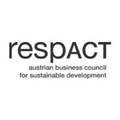Vienna (OTS) – respACT – austrian business council for sustainable development provides a panoramic view of the topic of greenwashing – experts from business, communication, science and law discussed in Vienna on Thursday.
Greenwashing is harmful, that much is clear. However, it is not only consumers and possibly the company’s image that suffer damage; corporate efforts to achieve the Sustainable Development Goals (SDGs) also suffer from the dilution of the concept of sustainability. “Austria’s companies are often committed to sustainable business. They not only change the corporate mindset or optimize energy use and mobility, they also take targeted measures to reduce their CO2 emissions and compensate – where not otherwise possible – by investing in climate protection projects. All of these efforts can and should continue to be communicated in a comprehensible manner. It would be wrong if the pioneering role model function for other companies and industries came to a standstill.”
, emphasizes Daniela Knieling, managing director of the non-profit corporate platform, which not only organizes a variety of informative and networking events on the topic of sustainability and business, but also supports its members with expertise. “The upcoming Green Claims Directive will give companies even more clarity and a verifiable framework for communication,” Knieling is certain.
Anti-Greenwashing
The Green Claims Directive was introduced in the EU Parliament in 2023 as a proposal to regulate green promises (“green claims”) and was also adopted by it in March of this year. Sustainable advertising messages have already been regulated uniformly throughout the EU in competition law and are ultimately decided by the ECJ, but are to be regulated more specifically in the new directive. The Green Claims Directive is expected to be voted on by the EU Council at the beginning of June and then handed over to the member states for implementation.
Misleading advertising messages are often avoidable errors in communication
Recent court rulings in Austria and Germany already show what is important: the targeted information of consumers about the meaning and impact of the advertising message and, if necessary, the appropriateness of the communicated measure. respACT has everything you need to know about the topic in cooperation with the law firm Binder Grösswang in oneFact Sheet summarized.
Greenwashing in reporting
“Many EU regulations on sustainability reporting have been introduced in the last few months and years,” summarizes Brigitte Frey, auditor and expert in sustainability reporting. “Even if coping with these new requirements sometimes seems overwhelming, an increasingly clear picture is emerging of the new consensus on which successful entrepreneurial activity is based.”
Frey is further convinced that “raising awareness against greenwashing will quickly lead to changes in communication.”
The tenor of the panel: Developing new practices together
Elisabeth Dal-Bianco, Communication Operations Manager at IKEA Austria and board member and Diversity, Equity & Inclusion Officer at the PR Association Austria (PRVA), summarized: “The growing regulations will mean an expansion of areas of responsibility and additional expertise. Through networking and continuing education, we can learn together from best practices and mistakes.”
“For marketing departments, it means sharpening their senses and moving away from general environmental advertising messages towards specific environmental claims, always ensuring that these can be verified.”
advised lawyer Edgar Langeder and added: “Following the implementation of the directive that came into force last week into national law, sustainability labels or quality seals must also be based on a certification system or have been established by government authorities.”
“The role of sustainability management and sustainability communication in companies must become more professional. Our current research shows that sustainability is not yet a professional field – but we are observing that it is developing into one. Training skills for internal communication and further training will be particularly in demand.”
concluded Franzisca Weder, University Professor of Organizational and Sustainability Communication at the WU Vienna.
Gabriela Straka, board member at respACT and Austria’s innovator at the World Climate Conference COP28 shared her own learnings: “It is important to create training and further education opportunities, such as those offered by the respACT Academy – in the language and with practical examples that are understood at the respective organizational level. It is advisable to derive the topics from the materiality analysis from the ESG reporting.”
respACT Lounge “Greenwashing in an all-round view” on April 4th. discussed at CAPE10, Vienna: Elisabeth Dal-Bianco (IKEA, PRVA), Edgar Langeder (RPCK), Gabriela Maria Straka (Brau Union) and Franzisca Weder (WU Vienna) with technical moderation by Brigitte Frey.
Questions & Contact:
respACT – austrian business council for sustainable development
Mag. Marianne Sorge-Grace
+43 664 1972582
m.sorge-grace@respact.at
